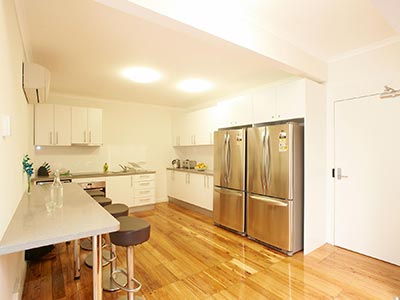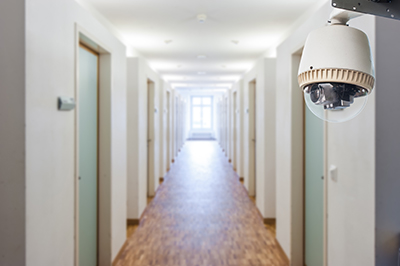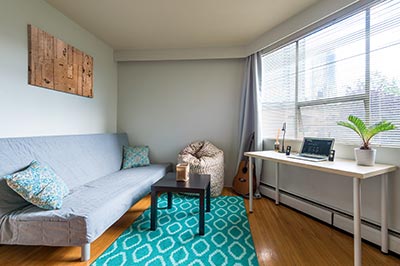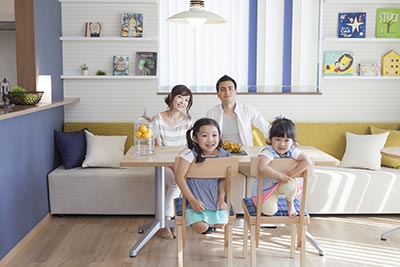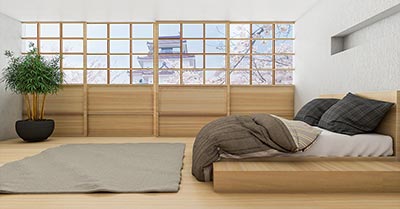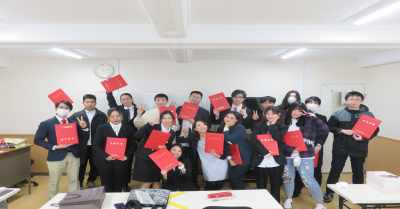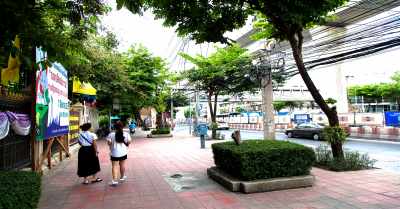Student housing when studying abroad
Where you live will have a big impact on your experience when you study abroad. Here we look at pros and cons of different accommodation options and what to think about when you book.
We can currently help you with student housing in Japan (in homestays, share houses, and private apartments), student housing in Korea and student housing in the US, UK, Australia, France, Spain, Germany, and many other countries at Uhomes.
In this article you can read more about:
Different kinds of student accommodation
How do you book student housing abroad?
Different kinds of student accommodation
Shared apartment
Shared apartment or share house is probably the most popular type of student accommodation. It is offered by many language schools and colleges around the world. You live in a furnished apartment with several bedrooms. You either have your own room or share a room with another student. Then you share bathroom, kitchen and other common areas with the other students who live in the apartment.
Pros of staying in a shared apartment
- It is often the cheapest accommodation option available for students abroad
- It is easy to make new friends and get to know the people you live with
- There are usually not so many rules when you live in a shared apartment
Cons of staying in a shared apartment
- There is a risk that you don’t get along with the people that you share the apartment with
- There is not always a lock on the individual rooms, and you will have less privacy than in most other accommodation options
Dormitory
A student residence or dormitory often consist of corridors with more or less identical rooms where many other students live. Usually, you have your own lockable room, and sometimes you also have a private bathroom. Otherwise, you share a kitchen, bathroom and other common areas with the others who live there. At US universities you often share your room with another student.
Pros of staying in a dormitory
- Dormitories are usually located on campus
- You have more privacy than in a shared apartment (unless you share a room with another student), but it is easy to meet friends in the common areas
Cons of staying in a student residence
- Dormitories can be pricey
- Dormitories sometimes have a curfew
- You are usually not allowed to have guests staying in your room
Private apartment
If you get your own apartment, you are free to live as you please. The schools usually do not offer own apartments, so you have to be prepared to arrange everything on your own.
Pros of staying in a private apartment
- Freedom
- Space
- You choose your location
Cons of staying in a private apartment
- Private apartment is usually the most expensive accommodation option where you have to cover rent, utilities, internet, insurance and all other costs that go with having your own In some countries, they will ask you for key money, a one-time fee before you can move in.
- If you rent an apartment on your own, they are often unfurnished, so you will have to buy all your furniture.
Homestay
If you go abroad to study language or if you are interested in the culture of the country you are studying in then host family is an excellent option. You have your own room but share bathrooms and other spaces with family members. Breakfast and dinner are often included, so you save both time and money and get the chance to try the local food. You can practice your language skills at dinner, and through the family, it is easier to get to know the locals. Family accommodation can often be booked through your school. We can help you book a host family in Japan.
Pros of staying in a homestay
- You get a better insight into the local culture
- You can improve your language skills by talking to your family
- You get a social context in your new country where the family can introduce you to people
- You get food, so you do not have to cook yourself
Cons of staying in a homestay
- You must show consideration for your family. For example, let them know in advance if you can not come home for dinner and be quiet if you come home late in the evening.
- If you are studying in a centrally located school in a big city, you will have to commute since host families rarely live in the city center.
How do you book student housing abroad?
There are two main ways to book student housing abroad. Either you book your accommodation through your school, or you arrange it on your own.
Book accommodation through your school
It is safe and easy to book accommodation through your school. They often have student housing in a good location on or near the campus. They should be able to give you good information about the accommodation and everything will be ready and waiting for you when you arrive. However, the schools have a limited number of student rooms so apply early if you want to book student housing through your school. Many schools only offer on campus accommodation for first year students
Find and book accommodation abroad on your own
Some schools offer no accommodation. Or maybe you think they charge too much or they simply do not have any availability in the accommodation that you are interested in. Then you can arrange your own accommodation instead. Then we recommend that you book a temporary place to live for the first week, e.g. a hostel, or a cheap hotel. Then you have some time to look at different accommodation options after you arrive, so you know what you will get before you sign a long-term contract. You can find accommodation with the help of:
DreamStudies: We can currently help you with student housing in Japan (in homestays, share houses, and private apartments), student housing in Korea, and student housing in the US, UK, Australia, France, Spain, Germany, and many other countries at our accommodation partner Uhomes. If you need more help to find accommodation close to your school? Then you can fill out Uhomes Student Apartment Application Form.
Your school: Schools often have a list of different options for off-campus accommodation that you can book on your own.
Other students at school: Talk to your classmates and look at bulletin boards and forums for students who are looking for a roommate or have a room for rent.
Social Media: Ask former students and others who live in the city if they can advise you on any good accommodation.
Online: Google phrases like "student housing" plus your place of study to find sites that offer student housing in your area. You can also use sites like https://www.craigslist.org and choose your location to find accommodation there.
Local housing agencies: It may cost a bit more, but you do not have to do all the work yourself.
Keep this in mind before signing a housing contract abroad
You will most likely be asked to sign a housing contract written in the local language so it helps if you have good language skills or if you can bring someone who can read it for you. Be sure to see the accommodation before you sign any contract if you book the accommodation on site.
Be extra careful if you rent from private hosts who want you to pay in advance. Always ask for a payment receipt and preferably don’t pay anything until you are in the accommodation and have received a key that fits the door. International students have occassionally been cheated when they were looking for accommodation abroad, so be careful if you do not book through your school or an established agency.
Check the contract period and cancellation conditions before you sign the contract. Some rooms can be rented on a monthly basis, but often you are agreeing to stay and pay for the entire contract period. Then it will be difficult to get a refund if you move out early, even if you have booked the accommodation through your school. So it is better to book a shorter period of time if you don’t know how long you want to stay there. Also make sure to get a study abroad insurance so you are covered if you cause some damage to your accommodation or need to interrupt your studies.

